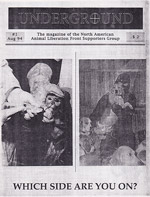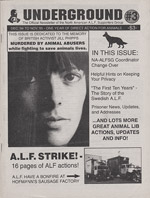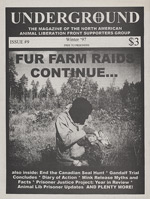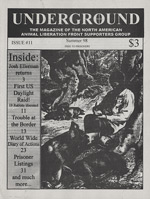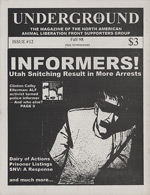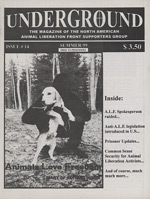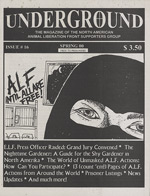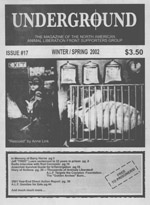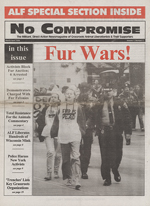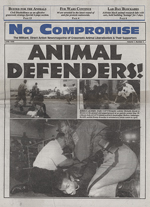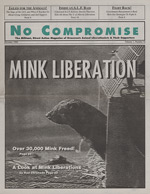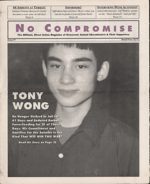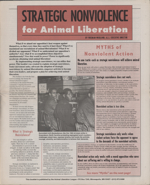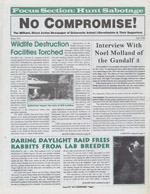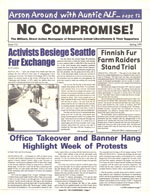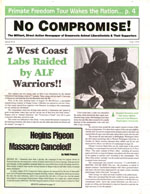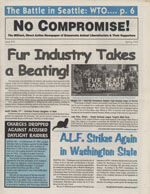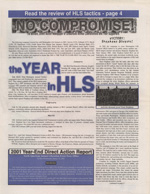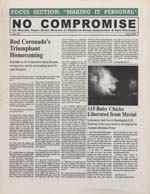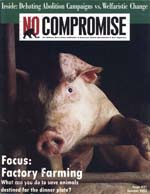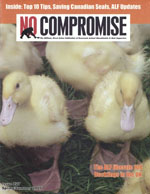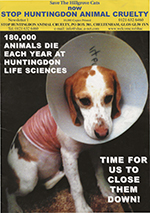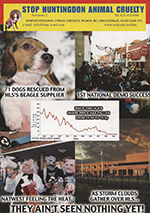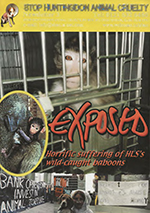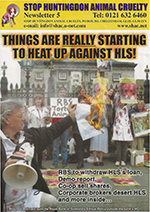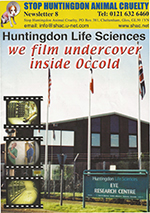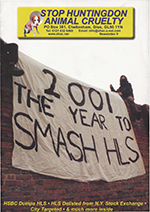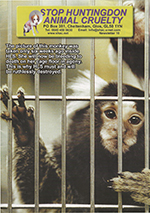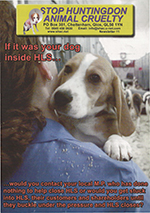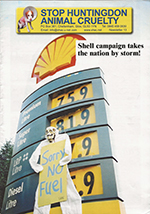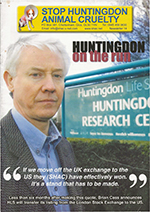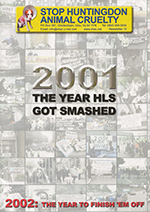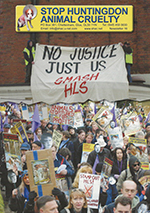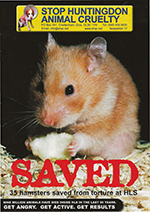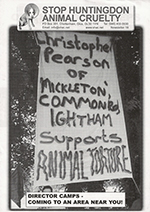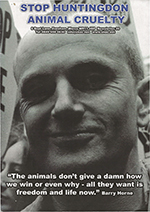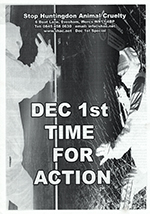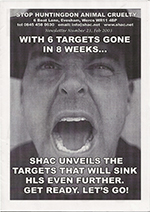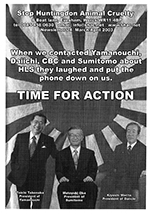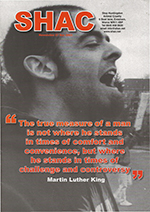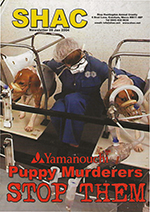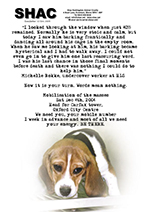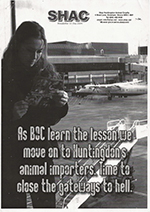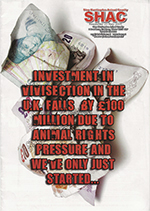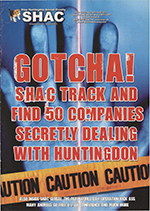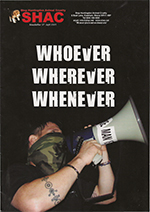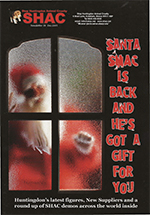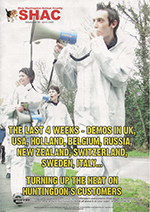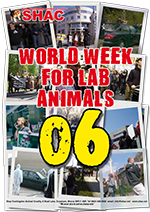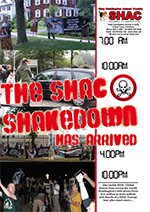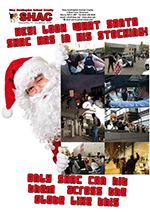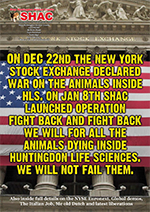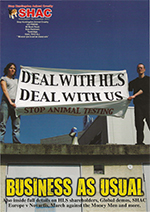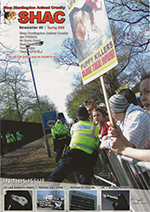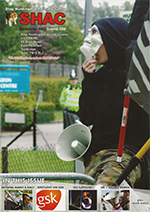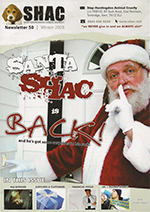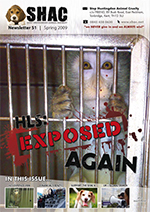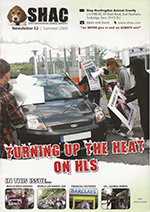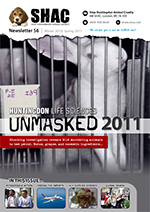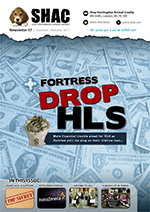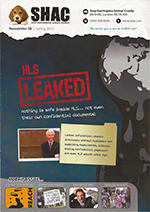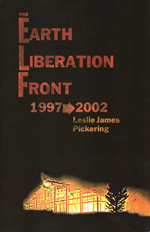The history covered in these volumes spans the most active period of direct actions for non-humans in both Canada and the United States. Among the various news articles and opinion pieces one can find plenty of infighting and internal critique, and often those debates ended up being the reason the next issue was delayed. Underground was plagued by the same problems as most small press, volunteer efforts: lack of funding, constantly rotating staff, and difficulties with printers and distributors. Despite all of this, Underground was amazing! Each issue was eagerly awaited during it’s print run, and it was widely read among the more radical portions of the movement.
Crucial (Page 2)
The Complete No Compromise
No Compromise 1-30. Includes Strategic Non-Violence for Animal Liberation insert included with issue #8 as separate publication. (1996-2006, Sacramento, CA / Minneapolis, MN / Caldwell, NJ / Old Bridge, NJ / Santa Cruz, CA / San Francisco, CA)
Text postNo Compromise, which billed itself as “The militant, direct action newsmagazine of grassroots animal liberationists and their supporters,” was the most important animal rights publication of the 1990s. Despite its many problems, frequent delays, and constant changes in editorial staff, the magazine energized the movement in a way that is difficult to explain to a generation that never witnessed pre-internet activism.
In the mid 90s there were a few, isolated groups around the country who were participating in civil disobedience actions and staging loud protests against local labs and fur stores. These groups were largely unaware of each others’ existence and without a gathering like Earth First!’s Round River Rendezvous, unable to share tactical advice or co-ordinate targets.
In 1996 there was a national meeting of animal rights activists in Washington DC dubbed World Animal Awareness Week and March for the Animals. The event was considered a failure as only 3,000 of the estimated 100,000 participants materialized. But staff from No Compromise were present passing out the first issue and asking grassroots organizations for their contact information. Suddenly groups like the Animal Rights Direct Actions Coalition were meeting with the Coalition to Abolish the Fur Trade, the Animal Defense Leagues, and the Student Organization for Animal Rights.
As the grassroots grew increasingly aware of the efforts of other organizations, regional demonstrations began being planned. The first such demonstration after the March for Animals took place at the Seattle Fur Exchange, where activists used bike locks to attach themselves to each other and block the drive way of the fur auction. All of the action got reported on in No Compromise, and suddenly bike locks gave way to lock boxes, which gave way to super boxes and barrels and tripods as civil disobedience tactics spread across the country wherever the magazine was distributed. There was an explosion not just in voluntary arrest scenarios, but also in underground direct action. The print runs of No Compromise kept climbing and it became the must read publication for animal rights militants.
The tone of the magazine at its start was hopeful, and each issue was packed with increasingly daring protests and direct actions. As the movement struggled to find focus and dealt with the departure of founder Freeman Wicklund, the the mood shifts to frustration and confusion, only to be plucked back into hopeful territory with the rise of SHAC.
After 30 issues, the steering committee of No Compromise decided to stop publishing in 2006. Their decision could not have come at a worse time. With the SHAC website and newsletter killed by the convictions of the SHAC 7, Bite Back being published only sporadically and with a limited focus, and the Earth First! Journal mired in infighting, the sudden absence of No Compromise meant that the primary sources for radical animal liberation news, opinion, and strategy were the twin sewers of online social networks and the North American Animal Liberation Press Office. These were dark times for our movement, and we are only just beginning to recover.
The Complete Stop Huntingdon Animal Cruelty UK Newsletters
Stop Huntingdon Animal Cruelty (UK) Newsletters 1-58. (1999-2011, Various Locations, England)
It is difficult to contextualize this publication for newcomers. The SHAC UK newsletters were at once an internal and external mode of communication written with a tongue in cheek militancy and that tabloid style so specific to England. The campaigners who received the newsletter were in on the joke: the customers of HLS who had their information published in each issue were not. The layout, design, page count, and paper quality of the magazine changed every so often, not only due to new staffing and equipment over its run, but also due to arrests, raids, budget constraints, and the problem of finding printers who had not yet been put off by police inquiries and harassment.
Buried in these pages are the day to day protests and mischief that, added together, made up years of global campaigning against a multinational animal abuser. Mistakes were made, new tactics were developed, and along the way company after company fell to the onslaught of a movement united in a single goal. This collection is a time machine that allows us to watch history as it was made.
The Hunt and the Anti-Hunt
The Hunt and the Anti-Hunt (1982, London, England)
“It is not difficult to understand why animals are treated so indifferently in a society where the powerful minority holds the majority in similar contempt.” Philip Windeatt
Grounded firmly in a traditional British left-socialist critique, The Hunt and the Anti-Hunt is Philip Windeatt’s classic treatise on opposition to bloodsports. Written shortly after the author worked as a researcher on The Animals Film, each page drips with anger at both the act of sport hunting and the economic class that perpetuates it.
Anyone seeking a better understanding of the history of the animal liberation movement would do well to read this short book. Tracing bloodsports back to the domestication of canines for hunting purposes, the book continues by describing the founding of early animal welfare societies and the eventual emergence of the Hunt Saboteurs Association and Animal Liberation Front. Along the way expect a refreshing analysis of the pillaging of public lands, human alienation from wilderness, corporate governance, and many other subjects that were too often missing from the animal lib literature of the 1980s.
Earth Liberation Front 97-02
Earth Liberation Front 1997-2002 (2003. Second printing with new dedication and layout 2007. Portland, OR)
Leslie James Pickering grew up in Buffalo, NY. In the mid 90s he became involved in the local hardcore music scene. While attending shows in the surrounding area, he began reading the literature distributed there by local animal rights groups. Zines such as Holocaust (published by Animal Defense League founder Kris Qua) were his introduction to radical politics and support for underground direct action.
Like most kids who grow up in smaller cities, Leslie James left Buffalo as soon as he had the means. After a brief stint skateboarding in San Francisco (during which time he filmed for the underground skate video rarity “Heat Zone”) Pickering landed in Portland, OR. There, he met Craig Rosebraugh, and after a few years the two of them began publishing a newspaper called Resistance with other members of a group called Liberation Collective. At this same time, a group calling themselves the Earth Liberation Front began a series of arson attacks against companies involved in logging and other environmentally harmful practices. They sent their first media statement to Liberation Collective, and the rest of the story is what Pickering documents in Earth Liberation Front 97-02.
Consisting of reprints, interviews, and some original material, Earth Liberation Front 97-02 is a must read for those who wish to understand the beginnings of the Green Scare.
SHAC Revisited
SHAC USA newsletters, Various Issues (2001-2006, Philadelphia, PA)
Diaries From Hell (2001, Princeton Junction, New Jersey)
The Mandate & Strike Back – Shac Videos (2002, Philadelphia, PA)
Today marks the end of a very long journey for me. After more than two years on pre-trial release, eight months on house arrest, three years in prison, and three years on probation, my life is now my own again. As of this morning I no longer need to fill out monthly reports, open my home to law enforcement at any time without probable cause, give the government constant access to my e-mail and social media accounts, or stay confined within the western district of Washington. Best of all, I can return to the kind of organizing that I love and live the life of conscience that I committed myself to so many years ago.
The people who took away my freedom did not do so because I was breaking the law. In fact, they knew that I was not doing so. FBI documents show that I was under almost constant surveillance for years of my life. One field office after another followed me in an attempt to prove that I was “the nexus of illegal [animal and earth liberation related] crime in the Northwest.” They hired informants to befriend me, went through my garbage, paid off my mail carrier to write down the return addresses of my incoming mail, attempted to entrap me, raided my home… the list could go on and on. In the end they had some tapes of lectures I gave advocating forms of hacktivism, and for that speech activity I had my life interrupted for the better part of a decade. An appeals court later said this about my conviction: “Harper’s personal conduct does not cross the line of illegality; to punish him simply on the basis of his political speeches would run afoul of the constitution.” They then went on to uphold my conviction.
If all of the years stolen from me were not about crimes I had committed, what was the government’s motivation? The answer to that question is complex, but I believe the primary concern for the ruling class was that I had begun to see through their illusions of status and power. I know how grandiose- even absurd- that may sound, but please bear with me for just a moment. I was born to working class parents so poor that my first crib was made from a dresser drawer. My mother worked in convenience stores, cleaned homes, and toiled away her health in a frozen foods warehouse. My father was a Vietnam veteran who had survived a fire in the tank he was driving. The horror that he experienced in our government’s imperialist venture in south-east Asia colored every moment of our home life. He returned from his time in the army addicted to drugs, disabled, and in constant pain from shrapnel that was still lodged in his skull. He worked off and on as a mechanic and small time drug dealer. This is the situation that I was raised in, but I am not complaining. My parents loved me and my sister, and despite their mistakes they did their best to help me become a good person. My dad once saw two cops harassing a homeless man outside of a 7-11. They kept asking him if he was “an illegal” and made several references to his race, repeatedly calling him “amigo.” Everyone sat in their cars and watched. Everyone except for my dad, who got out and challenged the police. That moment taught me more than any private school or university ever could have. And while my mom couldn’t always afford the clothing that I selfishly demanded when I was kid, she never bowed down to anyone higher on the social ladder. When some entitled rich kid gave her shit at work, she gave it right back and then some. My heart swells with pride when I think about the warning she got from her bosses at one job: she was required to provide service to police officers and had better begin doing so or else she would be fired. After years of seeing the cops in Eugene, OR beat and harass the underclass she wouldn’t sell them coffee and doughnuts, and continued in her disobedience even when her job was on the line.
I always knew that no matter what my economic status was, that my life was just as valuable as that of a billionaire or a president. I do not care about their titles or money or connections, but I began to care an awful lot about their abuses of power. The wealthy elite, who strip this planet of its life support system, who benefit from racism, sexism, and homophobia, who view our non-human kin as machines for profit, who turn the masses against each other, are made of flesh and blood just like you and I. They want us to believe in corporate personhood because it distracts from the man behind the curtain, the vulnerable decision makers who use towers of steel and concrete to appear more powerful.
This was the threat of Stop Huntingdon Animal Cruelty; we saw through all of the social conditioning that tells us that we are too weak to effect change. We went straight to the homes of those in power, challenged them on their golf courses, screamed at them while they vacationed at summer homes. We were the barbarians at the gate, an alliance of the kind of people who did not usually get heard by the mega-rich of the world. Tooth and nail we went after their profits, and along the way refused to divide and fracture over broken windows or graffiti. Everyone was welcome if they would fight, and I smile so big it hurts when I think of the grandmothers, the punks, the students, and all the other unlikely comrades who marched together in defiance of the false hierarchy that tells us to keep separate and leave the rich to their own devices. We didn’t stay in our place. In fact, we recognized that our place was wherever the hell we chose, and the world of finance and animal abuse was rocked as a result.
This isn’t to say that we were perfect. We made so many mistakes, and we must be accountable for them. As Conflict Gypsy completes its archives of Huntingdon Life Sciences campaign materials we will be critical of the movement’s failures. But today, as I leave Washington to see my family and friends and celebrate my new freedoms, I hope that the spirit of the campaign will infect you. All of us have a revolutionary spark in our hearts, and together these individual sparks provide a beautiful warmth that melts away the cold sterility created by our rulers. Together we can turn the tide of ecocide, of prejudice, of economic and political exploitation. Never, ever believe otherwise.
For animal liberation, for global revolution, and for joy! Yours always,
Josh Harper
July 2nd, 2012
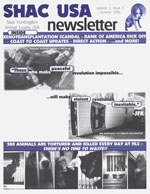 |
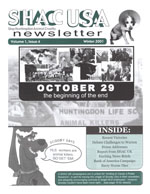 |
 |
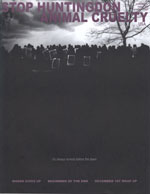 |
||
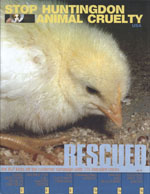 |
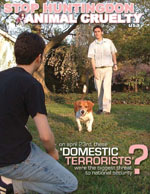 |
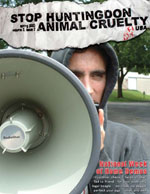 |
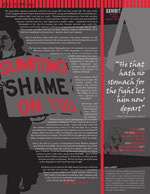 |
||
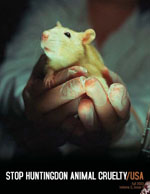 |
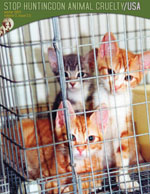 |
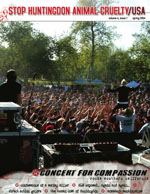 |
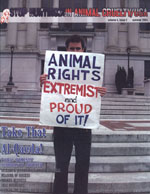 |
||
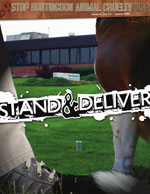 |
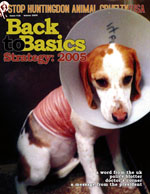 |
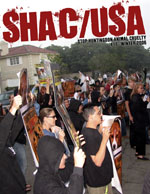 |
 |
||
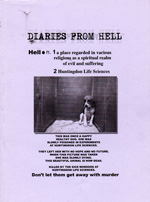 |
 |
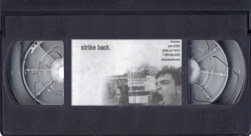 |
Against All Odds
Against All Odds (1986, London, England.)
Editors note: The TALON Conspiracy endeavors to archive the best, most complete copies available of all publications in our collection. Although Against All Odds had previously been posted on March 14, 2011, we have since found a higher quality copy from the original publisher. Our first posting had been a Canadian reprint with bad generation loss that was also missing several photos printed in the British edition. The Canadian version can still be found here.
Originally published in England as a book 25 years ago, Against All Odds was regularly distributed in North America as a low cost zine. It remains one of the best publications documenting the rise of the Animal Liberation Front and the Animal Liberation Leagues in England.
In many ways, the 1980s was the high water mark of the Animal Liberation movement. In 1984, thousands of people in England participated in direct action against vivisection, staging large scale raids against six labs. Multitudes of people would overwhelm security in broad daylight and remove the oppressed creatures inside, often causing minor damage along the way and taking out valuable footage which was used to grow the movement. Many dozens of arrests followed these raids, but it is arguable that police response was not the cause of death of this mass militant movement taking shape in the UK.
Around this same time we saw the emergence of groups such as the Hunt Retribution Squad and Animal Rights Militia. Rather than rejecting the idea that animal rights activists were fanatics, HRS and ARM embraced that term and seemingly reveled in the negative imagery presented by the media. The Hunt Retribution Squad went so far as to release images of masked activists wielding clubs, chainsaws, and even pavement cutters. The front pages of newspapers widely reported on threats made by HRS to harm hunters if they attacked human opponents of hunting. In the end these counter-assaults never took place, but the damage was done. This type of macho posturing was repellant to many in the movement, and it provided great fodder for the police, courts, and conservative PR teams to use in the war against direct action. Certainly, the few acts of violence taken by the Animal Rights Militia could not outweigh the value of the mass raids and rising public consciousness taking place in England at the time and largely contributed to the recession of a growing struggle for non-human emancipation.
Written in accessible language and unafraid of nuance, its tactical analysis and historical documentation remain valuable to this day. Against All Odds is essential reading for the modern animal liberationist.

Spirit of Freedom: The newsletter of the North American Earth Liberation Prisoner Support Network
Spirit of Freedom: The newsletter of the North American Earth Liberation Prisoner Support Network (Dec 2000 through Spring 2002, Eugene, OR)
As the boom of environmentally motivated arson and sabotage accelerated at the turn of the century it quickly became clear that the government, on behalf of their corporate sponsors, had a crackdown in the works. Unable to catch those responsible, the heat was turned up on support networks, spokespeople, and peripheral figures in the anarchist and radical wilderness defense communities. Grand jury subpoenas, congressional hearings, and new legislative efforts at repression seemed constant. British activists, having long dealt with similar threats, began urging radicals in the US to start a support network for the inevitable arrests and imprisonment of eco-warriors.
Working closely with Noel Molland (AKA Rabbix, publisher of R@T and Eco-Vegan) a young anarchist and former member of ADL New York named Daniel McGowan helped found The North American Earth Liberation Prisoners Support Network. Their publication, Spirit of Freedom, soon became one of many excellent prisoner support zines coming out of the Northwest. Covering all aspects of the movement and lending solidarity to a wide variety of struggles, Spirit of Freedom was a consistent source of revolutionary news and crucial support for our jailed comrades.
As the decade progressed Daniel found himself needing the very type of support offered by the NAELPSN. Arrested during the “Green Scare” (Ironically, a term Daniel coined on an early cover of Spirit of Freedom) Daniel is now serving a 7 year sentence in a Communications Management Unit in Indiana. Please visit his support site at www.http://www.supportdaniel.org/ for more information.





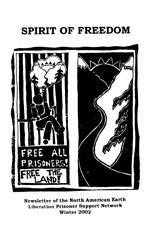
War At Home: Covert Action Against U.S. Activists And What We Can Do About It
War At Home: Covert Action Against U.S. Activists And What We Can Do About It (1989, Boston, MA.)
During the advent of illegal animal liberations in the United States the FBI had very little in the way of actionable intelligence on those responsible. That all changed when a mentally ill-former activist with a history of violence and stalking began speaking with the Bureau. His name was Bill Ferguson, and while he is best known as the activist who shot Last Chance for Animals founder Chris DeRose in the back, his legacy as the first North American super snitch is far more obscure. Once he began cooperating grand juries sprung up all over the country, homes were raided, and the dirty tricks experienced by other movements began entering the militant vegan arena. In response many grassroots animal organizations began to distribute Brian Glick’s excellent booklet, War At Home.
Clocking in at under 100 pages, War at Home covers all of the most important moments in the FBI’s Counter-Intelligence program, (Better known as COINTELPRO) including the events which occurred after COINTELPRO was supposedly shut down. In plain language and with surprising detail Glick discusses the means and aims of the FBI’s attempts at ending domestic dissent. More than a must read on past abuses, War At Home is also an invaluable handbook on security culture and support for those targeted by law enforcement harassment campaigns. The current wave of crackdowns on the Occupy movement make the free distribution of this booklet more important than ever- please share it with your friends.
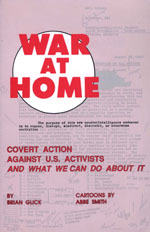 |
||
How to Speak Australian
Action For Animals newsletter #1-3 (1985 – 1986. Queensland, Australia.)
Agitator #1 (1987. Eltham, Australia.)
Action Reports #1 (1987. Eltham, Australia.)
Direct Action for Animal Rights newsletter #5-6 (1985 – 1986. Lutwyche, Australia.)
Despite his denouncement of most forms of illegal direct action, Peter Singer has played an interesting and unintended role in the history of the underground in his native Australia. After the success of his seminal utilitarian philosophy book, Animal Liberation, he founded a group by the same name in the land down under. This left some activists with an interesting question: should they continue using the name “Animal Liberation Front?” Many cells decided to forgo the confusion of a nearly identical moniker and instead acted under the banner of Action for Animals and Direct Action for Animal Rights.
Australia was one of the first countries outside of England to see resistance movements dedicated to non-humans. As raids and economic sabotage became more frequent, above ground supporters started small press publications to publicize the tactics and activities of these Aussie warriors. Later, as arrests began to mount, these publications also served to raise defense funds and promote acts of solidarity with animal rights prisoners.
Conflict Gypsy is hoping to track down complete sets of all the magazines featured in this post. If you can help us find them, please contact us at conflictgypsy (at) gmail (dot) com
 |
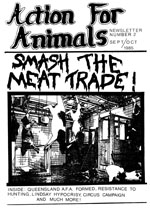 |
 |
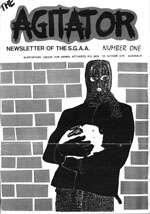 |
||
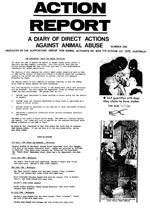 |
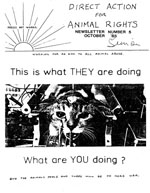 |
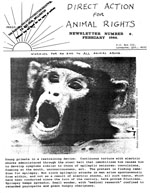 |
DISCLAIMER: animal liberationist is an online archive preserving the history of protest movements for animal rights and environmentalism. Its owners, contributors, and designers are not responsible for actions taken by third parties which may be harmful or unlawful to the individuals or entities named in archived publications. This web site is provided for the purpose of historical research and analysis, and is not intended to incite, encourage, or condone any criminal action on the part of its readers. All opinions expressed in our archives are those of their original authors only.

